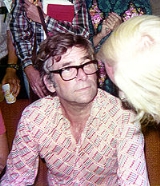
Gene Roddenberry
Eugene Wesley Roddenberry (August 19, 1921 – October 24, 1991) was born in El Paso, Texas and spent his boyhood in Los Angeles. He is best known as the creator of the science fiction television series Star Trek and was one of the first people to be buried in space.
Sourced
- A man either lives life as it happens to him, meets it head-on and licks it, or he turns his back on it and starts to wither away.
- "The Cage" (Star Trek first pilot), spoken by John Hoyt as "Dr. Philip Boyce" (0:06:18)
- Star Trek speaks to some basic human needs: that there is a tomorrow—it's not all going to be over with a big flash and a bomb; that the human race is improving; that we have things to be proud of as humans. No, ancient astronauts did not build the pyramids—human beings built them, because they're clever and they work hard. And Star Trek is about those things.
- in an interview on 1988-09-20 CE (seen on "Star Trek: The Next Generation", Season 5, DVD 7, "Mission Logs: Year Five", "A Tribute to Gene Roddenberry", 0:26:09)
- The strength of a civilization is not measured by its ability to fight wars, but rather by its ability to prevent them.
- shown at the end of an episode of Gene Roddenberry's Earth: Final Conflict. (http://www.space.com/sciencefiction/tv/efc_314_spoilers_000214.html)
Unsourced
- I condemn false prophets, I condemn the effort to take away the power of rational decision, to drain people of their free will - and a hell of a lot of money in the bargain. Religions vary in their degree of idiocy, but I reject them all. For most people, religion is nothing more than a substitute for a malfunctioning brain.
- In a contrast between 1960's astronauts consuming "Tang" and crewmen on the Enterprise eating solid food: "Why should a man give up the joy of ham and eggs if the technology will allow it?"
- In the 24th century there will be no hunger, there will be no greed, and all the children will know how to read.
- The glory of creation is in its infinite diversity.
- We must question the story logic of having an all-knowing all-powerful God, who creates faulty Humans, and then blames them for his own mistakes.
Misattributed
- Time is the fire in which we burn.
- Source: The Delmore Schwartz poem "Calmly We Walk Through This April's Day" from Summer Knowledge: New and Selected Poems (1959). The line was quoted in Star Trek: Generations; Schwartz was given credit in the film. http://en.wikipedia.org/wiki/Star_Trek:_Generations#Notes
